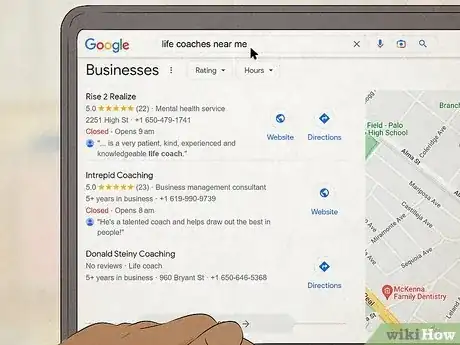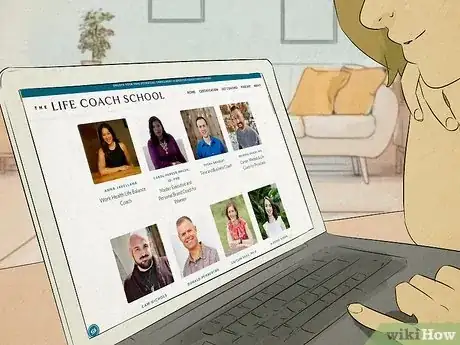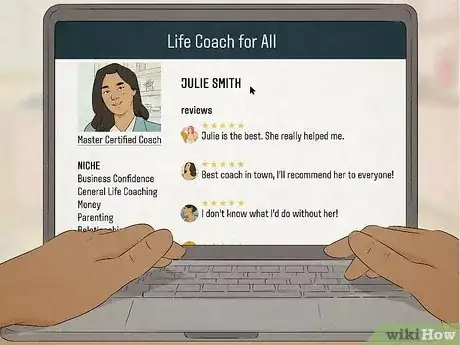This article was co-authored by John Strasser and by wikiHow staff writer, Ali Garbacz. John Strasser is a Certified Master Insight Coach and Master Insight Coaching Instructor at The Insight Coaching Community. With more than seven years of experience, John specializes in helping others work in the life coaching space and develop successful coaching businesses. John holds a BA in South Asian Religions from The University of South Florida and an MA in Buddhism and Hinduism from Columbia University. He has also studied Leadership Coaching at Harvard University.
There are 10 references cited in this article, which can be found at the bottom of the page.
Life coaches come with all different personalities, techniques, and values, so how can you find one that’s a perfect match for you? There’s a lot to consider when looking for a life coach who’ll be able to help you grow to your fullest potential, but the amazing relationship you two can share is worth a little initial research. Here, we’ll walk you through finding a life coach near you and list things to keep in mind as you go about your search. The perfect teacher, mentor, friend, and confidant is out there, and we'll help you find them!
Things You Should Know
- Utilize resources like life coach directories, search engines, and matching services to find a life coach in your area.
- Survey potential life coaches by looking for credentials recognized by the International Coaching Federation, testimonials from clients, and competitive hourly rates.
- Identify what goals and expectations you have for your life coaching sessions, as it will give you a sense of direction and help you find a life coach who has worked with similar cases.
- Meet with your life coach for a trial session and decide from there if they're a good fit for you based on your first impression and the connection you felt.
Steps
Locating a Qualified Life Coach
-
1Use a matching service. This service will do the searching for you. Much like recruiters for job hunters, and even dating apps for people looking for that special someone, life coach matching services will assist you in finding someone whose methods and personality align with your goals. There are many matching services out there, both paid and free. To find the best match, use services that ask you about your personality and goals so that you can get a more personalized match.
- Life Coach Hub offers both a matching service and a directory that potential clients can use.
- LifeCoach offers one-on-one matching services with their staff of accredited life coaches and also provides a quiz for potential clients to take to see if life coaching is right for them.
-
2Do a quick internet search to look for local options. Just typing in “life coaches near me” into the Google search bar will give you loads of results to browse through. You can survey life coaches who may be in your area or who provide online services, and you can also look at reviews from previous clients.Advertisement
-
3Check life coach directories to get lists of qualified life coaches. Online directories will give you a list of hundreds of life coaches. The International Coaching Federation (ICF) provides a directory that lets you look up specific life coaches and check their credentials and qualifications. The only downside is that these directories won’t tell you how well-matched a certain life coach will be to your own personal needs.[1]
- The Life Coach School also provides a directory on their website.
- Life Coach Magazine has a directory and offers great tips on finding a life coach.
-
4Get a referral from friends or family. You can trust your friends and family to have your best interest at heart, so ask them about their experiences with their life coach if they’ve had one. Of course, life coaching is something very unique to every person, so what might have worked for them may not necessarily be the right fit for you. If anything, take this as an opportunity to find out more about life coaching sessions and what did and didn’t work for others.
-
5Look into a life coach’s qualifications and credentials. There are no formal degree or certification requirements to be a life coach, but many life coaches will have taken some courses and obtained certification of some kind. When you’re looking at a life coach's credentials, look to see if they’ve received training from a program approved by the International Coaching Federation (ICF).[2]
- Along with a physical certificate or other qualifications, check to see if the life coach has actual hands-on experience working with clients. Getting a certificate is one thing, but actually practicing life coaching and interacting with real clients is a huge part of what makes a good life coach.
What does a life coach do?
-
1A life coach helps you focus on positive change and achieving future goals. It’s not the same as psychotherapy, which focuses more on past events and why a person is the way they are. Life coaching is all about changing for the better, improving self-awareness, and setting goals. Look into some life coaching practices and decide if this is the service you’re looking for.[3]
- Unlike therapists, life coaches do not have the legal authority to diagnose and/or treat mental health illnesses. They don't dive into their clients’ past with the intention of resolving past issues of traumas.[4]
-
2Life coaches give you tasks and assess your performance. Life coaches use methods that differ from those someone like a mentor may use. A life coach focuses on helping you reach your goals by giving you tasks and evaluating your performance. The relationship is often strictly professional and you may not meet for that long.[5]
- Mentors are people who will take you under their wing and help you to grow by sharing knowledge and experiences. Your relationship is more of a partnership, and you’ll be together for a longer period of time with no set end.
What to Look for in a Life Coach
-
1Look for a life coach who will help with your specific goals. You provide the goals you’d like to work towards, and your life coach will give you actionable steps to achieve them. Are you looking for guidance in your professional work life, or do you want to focus more on your personal life? What specific goals are you hoping to achieve, and what role do you see your life coach playing in that process? Coming up with clear expectations for both yourself and your life coach will help a lot when it comes to finding a good match. Some sample goals you might come up with include:
- Upping your productivity at work
- Improving your self-confidence
- Maintaining a healthy work-life balance
- Improving relationships
- Working on time management skills
-
2Pick a life coach whose area of expertise aligns with your goals. Like any profession, life coaches all have their own individual areas of expertise, or “niche” as it’s called in the life coaching world. Depending on how specific your goals are, you might benefit from searching for life coaches that fall into a specific niche and can give you more expert advice and assistance in developing those areas. A few examples of life coaching niches include:[6]
- Business coaching
- Health coaching
- Spiritual coaching
- Parenting coaching
- Relationship coaching
-
3Find a life coach with good reviews and testimonials. Read through reviews and testimonials from a life coach’s past clients to get an idea of that life coach’s particular methods, personality, and overall quality of work. Also ask your life coach if speaking to one or more of their past clients is an option. This way you can get the details straight from the source.[7]
-
4Choose a life coach who will meet online or in person, based on your preference. Both in-person and online life coaching sessions are available, and there are many options for life coaches no matter your preference. Some of the pros of an online session include possibly more flexible scheduling and the lack of a commute, while in-person sessions will give you that face-to-face connection that you may want.[8]
Meeting for the First Time
-
1Do an initial interview before you start your sessions. As important as it is for your life coach to get to know you, it’s equally as important that you learn as much as you can about them and their practice. They’ll hopefully give you some insight into how they usually conduct their sessions, the types of issues they’re more used to working with, and their beliefs and values as a life coach. Here are some sample questions you can ask when getting to know each other:[10]
- What types of issues do you normally work on?
- What is the usual duration of your coaching relationships with your clients?
- Can I contact you even outside of our scheduled session time?
- Do you give assignments, such as journal writing or reading?
- What is your method of measuring clients’ success in reaching their goals?
-
2Lay out your goals and expectations clearly during your initial meeting. Make sure you and your life coach are on the same page by being clear about the goals you’re hoping to achieve. Tell them your thoughts on how you see them helping you on your journey. Even if you don’t have a specific goal or achievement in mind, just telling them about your current situation can offer them some clarity.[11]
-
3Discuss pricing and refund options. Be upfront in asking about your life coach’s pricing. See if they offer multi-session packages or any other type of discount. Also ask about their personal cancellation and refund policies just so you have all of the details in case you need to use any of them in the future.[12]
-
4Note any particularly positive or negative feelings you felt towards your life coach. During that first meeting, take note of how you felt and the session’s overall atmosphere. Ask yourself if you felt comfortable talking to this particular life coach and felt as though you could really see yourself opening up to them. Take some time to really reflect on the following and decide if you’d like to come back for another session:[13]
- Did it seem like they were actively listening to what you had to say?
- Do you think they were able to understand what you were trying to tell them?
- Was their tone friendly and open?
- Did they seem empathetic and compassionate about the issues you brought up?
- Were they motivating and encouraging of you and your goals?
-
5Establish what the next steps are after your first meeting. Make sure they have a way to contact you and you have a way to reach out to them. Let them know if you need more time to think about whether you’ll be continuing your sessions. It’s also polite to give them a deadline for your decision so that you don’t accidentally end up ghosting them. Reflect on everything you learned during your first session and let them know your decision when you’re ready.[14]
References
- ↑ https://coachingfederation.org/
- ↑ https://www.cnbc.com/2021/03/26/what-is-a-life-coach.html
- ↑ https://www.cnbc.com/2021/03/26/what-is-a-life-coach.html
- ↑ https://www.camft.org/Resources/Legal-Articles/Chronological-Article-List/coaching-vs-therapy
- ↑ https://www.uopeople.edu/blog/coach-vs-mentor-whats-the-difference/
- ↑ https://www.lifecoachmagazine.com/how-to-find-your-coaching-niche/
- ↑ https://www.marieclaire.co.uk/life/health-fitness/how-to-find-a-good-coach-742379
- ↑ https://online.edhec.edu/en/blog/distance-coaching-vs-face-to-face-coaching/
- ↑ https://www.cnbc.com/2021/03/26/what-is-a-life-coach.html
- ↑ https://coachinginst.com/interview-questions/
- ↑ https://www.inc.com/jessica-zemple/10-questions-for-picking-your-perfect-life-coach.html
- ↑ https://www.inc.com/jessica-zemple/10-questions-for-picking-your-perfect-life-coach.html
- ↑ https://www.inc.com/jessica-zemple/10-questions-for-picking-your-perfect-life-coach.html
- ↑ https://www.psychologytoday.com/us/blog/the-angry-therapist/201707/5-things-look-in-life-coach













































































